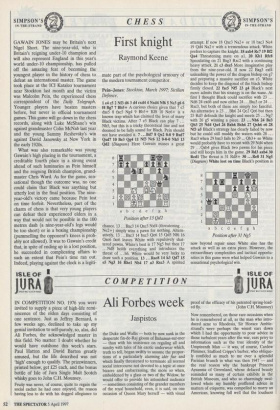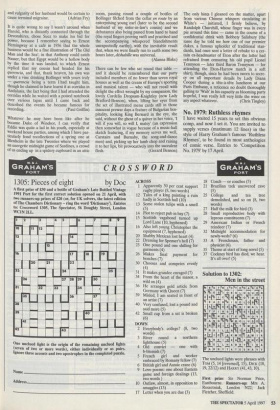J W%LI .41 ,CJICH WW1
URA
ISLE OF
j URA
SIVA' likl I SCLIICK INISKI
COMPETITION
Ali Forbes week
Jaspistos
IN COMPETITION NO. 1976 you were invited to supply a piece of high-life remi- niscence of the olden days consisting of one sentence. Just as Jeffrey Bernard, a few weeks ago, declined to take up my genial invitation to self-parody, so, alas, did All Forbes, the acknowledged master in this field. No matter: I doubt whether he would have outshone this week's stars. Paul Hatton and David Barton greatly amused, but the life described was not `high' enough to qualify. The prizewinners, printed below, get £25 each, and the bonus bottle of Isle of Jura Single Malt Scotch whisky goes to John C.H. Mounsey.
Fruity was never, of course, quite to regain the social cachet he had once enjoyed, the reason having less to do with his dogged allegiance to the Duke and Wallis — both by now sunk in the desperate fin-de-Raj gloom of Bahamas-sur-mer — than with his insistence on regaling all and sundry with tales of his exotic underwear which, truth to tell, began swiftly to assume the propor- tions of a particularly alarming idee fixe and which finally threatened to terminate all normal social intercourse not devoted to a topic at once bizarre and embarrassing, the more so when, emboldened by a glass or two of the Widow, he would offer to provide his astonished audience — sometimes consisting of the grander members of the royal household, even, it is said, on one occasion of Queen Mary herself — with visual proof of the efficacy of his patented spring-load- ed fly. (John C.H. Mounsey) Now remembered, on those rare occasions when he is remembered at all, as the man who intro- duced acne to Rhodesia, Sir Horace Amble- strand's were perhaps the wisest ears down which I had the opportunity to pour advice in those turbulent years after the war, ears privy to information such as the true identity of the Umpteenth Man — it was, of course, Cardew Plimmer, Stafford Cripps's barber, who oblique- ly confided as much to me over a splendid Parisian brunch in what was then 1947 — and the real reason why the bankrupt Princess Aysannia of Greenland, whose defaced beauty reminded so many of certain exhibits in the British Museum, and who so charmingly swal- lowed whole my humbly proffered advice in matters of etiquette, was compelled to marry an American, knowing full well that the loudness and vulgarity of her husband would be certain to cause terminal migraine. (Adrian Fry)
It is quite wrong to say I wasn't around when Harold, who is distantly connected through the Devonshires, chose Suez to make his bid for power, because I remember saying to Ernest Hemingway at a café in 1956 that the whole business would be a fine illustration of 'The Old Man and the Sea', in that Anthony could catch Nasser, but that Egypt would be a hollow body by the time it was landed, to which Ernest replied that my cousin had headed for his querencia, and that, thank heaven, his own was under a vine drinking Bollinger with yours truly — querencia being a term I had taught him, though he claimed to have learnt it at corridas in Andalusia, the fact being that I had attended the corridas while he waited with a poised notebook over various tapas until I came back and described the events he became famous for
recording. (Paul Griffin) Whatever he may have been like after he became Duke of Windsor, I can verify that Eddie was quite a lad in his youth, especially at weekend house parties, among which I have par- ticularly fond recollections of a spring one at Blenheim in the late Twenties where we played an energetic midnight game of Sardines, a crowd of us ending up in a spidery cupboard in an attic
room, passing round a couple of bottles of Bollinger filched from the cellar en route by an enterprising young earl (later to be the second husband of my sister-in-law's cousin) and we debutantes also being passed from hand to hand (the royal fingers proving swift and practised and the accompanying whispered blandishments unexpectedly earthy), with the inevitable result that, when we were finally run to earth some two hours later, deshabille was universal.
(Alanna Blake) There can be few who sat round that table and it should be remembered that our party included members of no fewer than seven royal houses as well as the cream of Europe's sporting and musical talent — who will not recall with delight the effect wrought by my companion, the lovely Cordelia Dropsam-Knightley (now Lady Bratford-Benson), when, lifting her eyes from the set of illustrated menu cards still in those innocent prewar days a feature of Bulgarian hos- pitality, looking King Bernard in the eye, she said, without the ghost of a quiver in her voice, 'I will if you will, so will I, matey' (an expression then somewhat in vogue because of a music-hall sketch featuring, if my memory serves me well, Carstairs and Burnaby, the song-and-dance men) and, picking up her lamb chop and raising it to her lips, bit provocatively into the succulent flesh. (Gerard Benson) The only hints I gleaned on the matter, apart from various Chinese whispers circulating at White's — initiated, I firmly believe, by Randolph Churchill, whose finger was in every pie around this time — came in the course of a confidential drink with Bobbety Salisbury (the same day he told me how one of our premier dukes, a famous upholder of traditional stan- dards, had once sent a letter of rebuke to a cer- tain ex-headmaster of Eton after the latter had refrained from censuring his old pupil Lionel Tennyson — later third Baron Tennyson — for attending the Eton-Harrow match in a soft shirt), though, since he had been sworn to secre- cy on all important details by Lady Diana Cooper during a tete-a-tete luncheon at our Paris Embassy, a reticence no doubt thoroughly galling to in his capacity as blooming party hopeful, I was really left very little the wiser on any aspect whatever. (Chris Tingley)
No. 1979: Ruthless rhymes
I have waited 15 years to set this obvious comp, and now I set it. You are invited to supply verses (maximum 12 lines) in the style of Harry Graham's famous 'Ruthless Rhymes', to be found in most anthologies of comic verse. Entries to 'Competition No. 1979' by 17 April.



























































 Previous page
Previous page